Looking to ease your anxiety while keeping your furry friends safe? Consider these five calming, pet-friendly plants. Lavender's soothing scent can reduce stress for both you and your pets. Chamomile offers natural sedative effects, promoting relaxation and better sleep. Spider plants purify the air and provide a gentle, calming visual. Basil's aromatic properties help bust anxiety, while lemon balm boasts potent soothing effects. All these plants are safe for pets when used appropriately. You can grow them indoors or in your garden, creating a tranquil environment for everyone. Discover how these green companions can transform your home into a sanctuary of calm.
Key Takeaways
- Lavender reduces anxiety in pets and humans with its calming scent and can be easily grown outdoors.
- Chamomile acts as a natural sedative for pets and owners, suitable for indoor or outdoor cultivation.
- Spider plants purify air and create a calming environment, while being non-toxic to cats and dogs.
- Basil's aromatic properties help reduce stress in pets and can be grown indoors for easy access.
- Lemon balm soothes anxious pets with its calming effects and can be used as a tea or crushed leaves.
Lavender: Nature's Stress Reliever
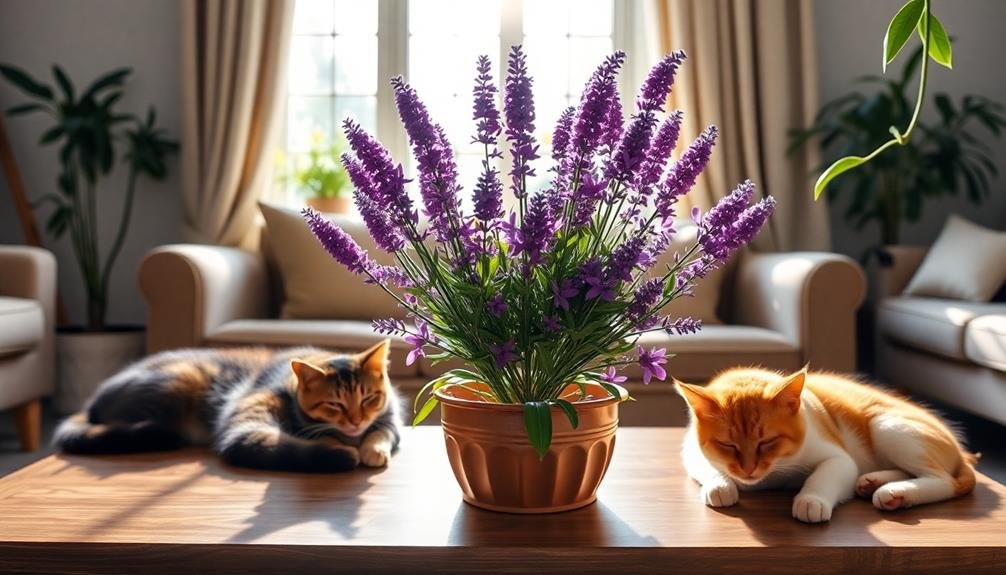
From out of your garden, lavender stands as a calming beacon for both humans and pets alike. This versatile plant not only adds a touch of purple beauty to your outdoor space but also serves as a natural stress reliever for you and your furry companions. Lavender's soothing scent can help reduce anxiety and promote relaxation in both people and animals.
You'll find that lavender is easy to grow and maintain, thriving in well-drained soil and full sunlight. It's drought-tolerant, making it an excellent choice for water-conscious gardeners. The plant's essential oils contain compounds that have been shown to have sedative effects, potentially helping to calm nervous or hyperactive pets.
While lavender is generally safe for most animals, it's important to monitor your pets' interactions with the plant. Some animals may be sensitive to its strong scent or oils.
You can use lavender in various forms, such as dried sprigs placed in your pet's bedding or as a diluted essential oil spray for their environment. Always consult with your veterinarian before introducing new plants or essential oils to your pet's routine.
Chamomile for Calm Companions
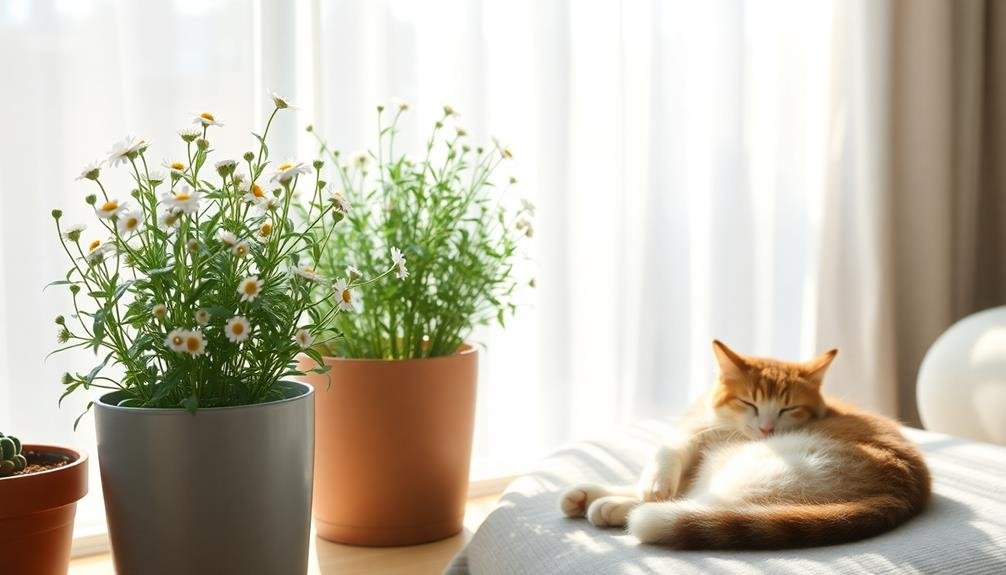
Moving from the purple hues of lavender, we encounter another calming powerhouse in the world of pet-friendly plants: chamomile. This daisy-like flower isn't just for tea; it's a natural sedative that can help soothe both you and your furry friends. You'll find that chamomile's gentle scent can reduce anxiety and promote relaxation in your home environment.
Chamomile is safe for most pets when used in moderation. You can grow it indoors or in your garden, providing a readily available source of calm. Its soft, feathery leaves and delicate white flowers add a touch of serenity to any space. Consider brewing a mild chamomile tea to use as a relaxing spray for your pet's bedding or favorite spots.
| Benefit | For You | For Your Pet |
|---|---|---|
| Reduces Stress | ✓ | ✓ |
| Improves Sleep | ✓ | ✓ |
| Soothes Digestion | ✓ | ✓ |
Pet-Safe Spider Plants
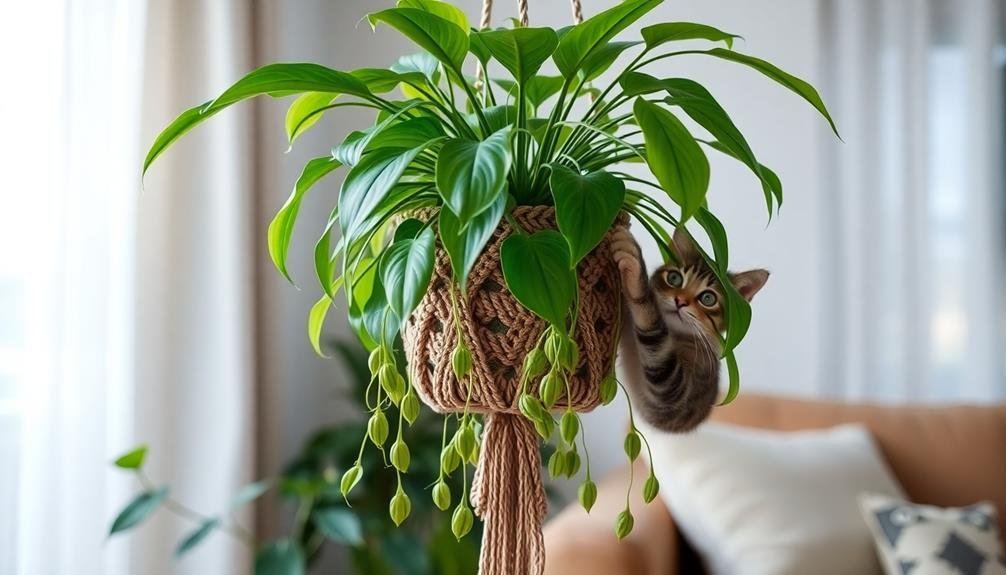
With long, arching leaves that resemble spiders' legs, spider plants are a popular choice for pet owners seeking a safe and attractive houseplant.
These resilient plants are non-toxic to cats and dogs, making them an excellent addition to your pet-friendly home. Spider plants are known for their air-purifying qualities, removing indoor pollutants and improving air quality for both you and your furry companions.
You'll find spider plants easy to care for, thriving in indirect sunlight and requiring minimal watering. They're perfect for hanging baskets or elevated planters, keeping them out of your pet's reach while adding a touch of greenery to your living space.
Spider plants also produce small plantlets, or "spiderettes," which dangle from the main plant, creating an interesting visual effect.
While generally safe, it's best to discourage your pets from nibbling on spider plants to prevent digestive upset.
Place them strategically around your home to create a calming environment for your anxious pets. The gentle movement of the leaves can provide a soothing visual element, contributing to a more relaxed atmosphere for both you and your animal companions.
Basil: Aromatic Anxiety Buster
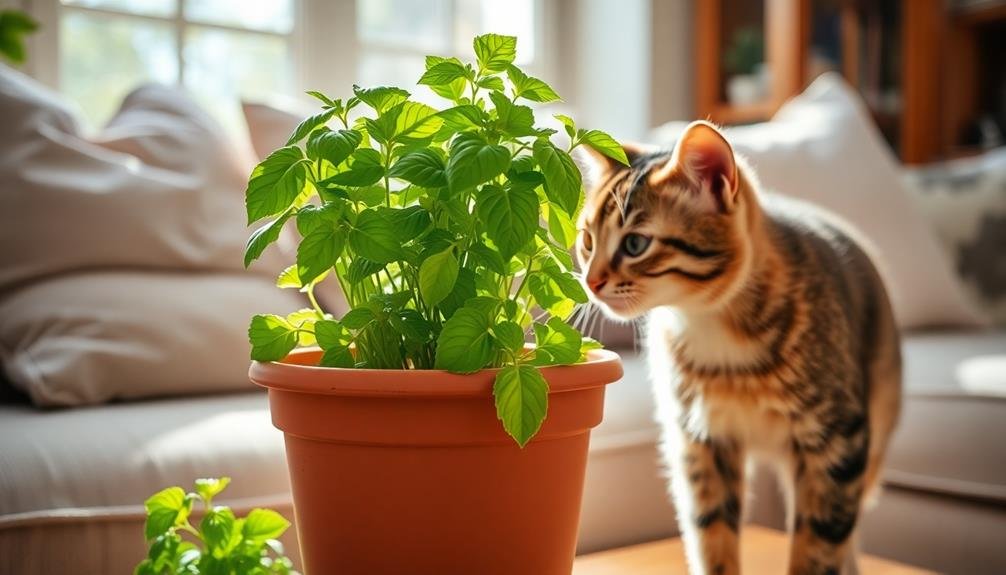
Basil's aromatic charm extends beyond the kitchen, offering a natural remedy for pet anxiety. This fragrant herb contains compounds that can help calm both you and your furry friends.
You'll find that growing basil indoors not only adds a fresh scent to your home but also provides a soothing atmosphere for your pets.
To incorporate basil into your pet-friendly space, place potted plants in areas where your animals spend time. The herb's gentle aroma can help reduce stress and promote relaxation.
You can also gently rub basil leaves between your fingers to release more of its calming scent. Remember, while basil is safe for pets, it's best to keep the plants out of direct reach to prevent excessive nibbling.
For an added anxiety-busting boost, try making a natural room spray using basil essential oil. Mix a few drops with water in a spray bottle and mist it around your home.
This creates a calming environment for both you and your pets. With its dual purpose as a culinary herb and anxiety reducer, basil is an excellent addition to any pet-friendly household.
Lemon Balm's Soothing Properties
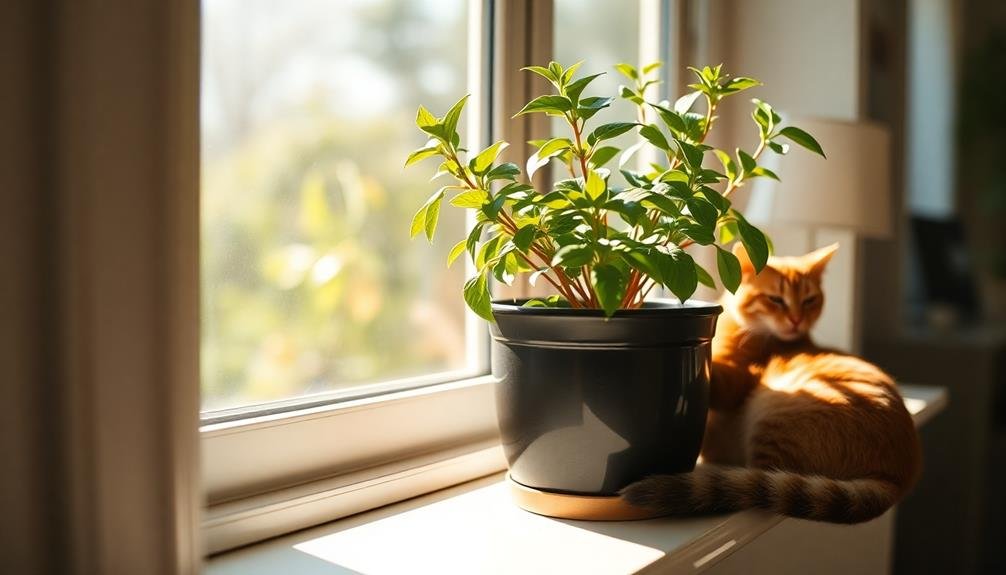
Among the calming plants for pets, lemon balm stands out with its potent soothing properties. This herb, known scientifically as Melissa officinalis, belongs to the mint family and boasts a delightful lemony scent.
You'll find it's not only safe for pets but also offers numerous benefits for both animals and humans alike.
Lemon balm's calming effects stem from its high concentration of rosmarinic acid, which helps reduce anxiety and promote relaxation. When your pet is feeling stressed, you can crush a few leaves and place them near their resting area. The released aroma will help soothe their nerves naturally.
You can also brew lemon balm tea and, once cooled, add it to your pet's water bowl in small amounts. This gentle remedy can help ease digestive issues and reduce restlessness. For cats, lemon balm serves as a milder alternative to catnip, providing a calming effect without the hyperactivity often associated with catnip.
Growing lemon balm is easy, as it thrives in various conditions. Plant it in a sunny spot in your garden or in a pot indoors. Regular pruning will encourage bushier growth and prevent it from spreading too aggressively.
Frequently Asked Questions
How Often Should I Water Pet-Friendly Plants?
You should water pet-friendly plants when their soil feels dry to the touch. Check them every few days, but don't overwater. Most indoor plants need watering once or twice a week, depending on the species and environment.
Can These Plants Help Reduce Noise-Induced Anxiety in Pets?
Yes, certain plants can help reduce noise-induced anxiety in pets. You'll find that leafy plants absorb sound waves, creating a quieter environment. They also provide visual barriers, making your pet feel more secure and less stressed by outside noises.
Are There Any Pet-Friendly Plants That Repel Insects?
Yes, you'll find several pet-safe plants that repel insects. You can try planting lavender, rosemary, or mint in your garden. These herbs not only keep bugs away but are also safe if your pets accidentally nibble on them.
What's the Best Way to Introduce New Plants to Pets?
To introduce new plants to your pets, start by placing them in a separate area. Let your pets sniff from a distance. Gradually move the plants closer over time. Always supervise interactions and reward calm behavior with treats.
Can These Plants Be Harmful if Ingested in Large Quantities?
Yes, even pet-friendly plants can be harmful if your furry friend eats too much. You'll want to monitor your pet's interaction with any new plants and consult your vet if you notice excessive consumption or unusual behavior.
In Summary
You've discovered five fantastic plant options that can help soothe both you and your furry friends. By incorporating these pet-friendly plants into your home, you'll create a calming environment for everyone. Remember to introduce new plants gradually and monitor your pets for any adverse reactions. With these natural stress-relievers at your fingertips, you'll be well on your way to a more relaxed household. Enjoy the benefits of these green companions and watch your anxiety melt away.

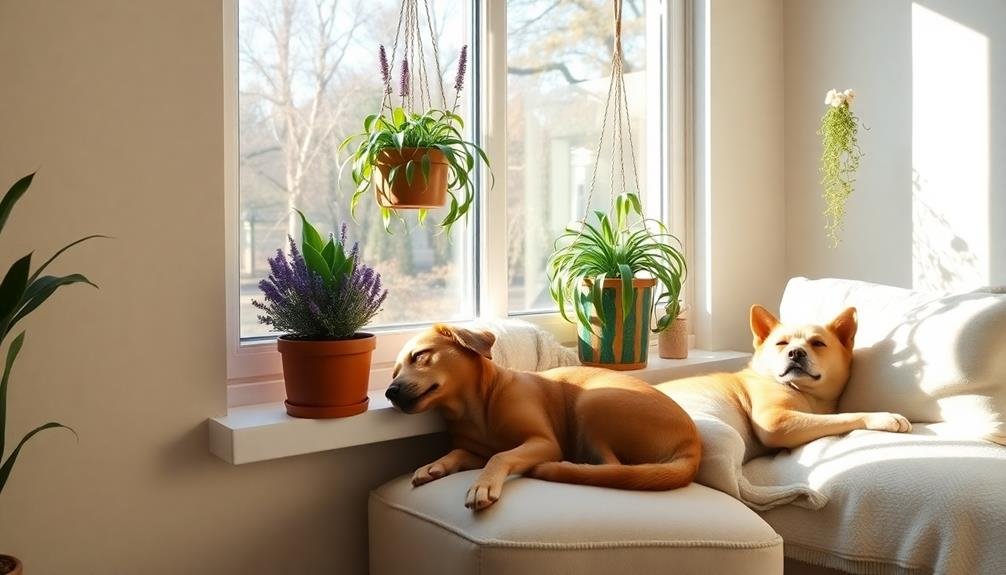

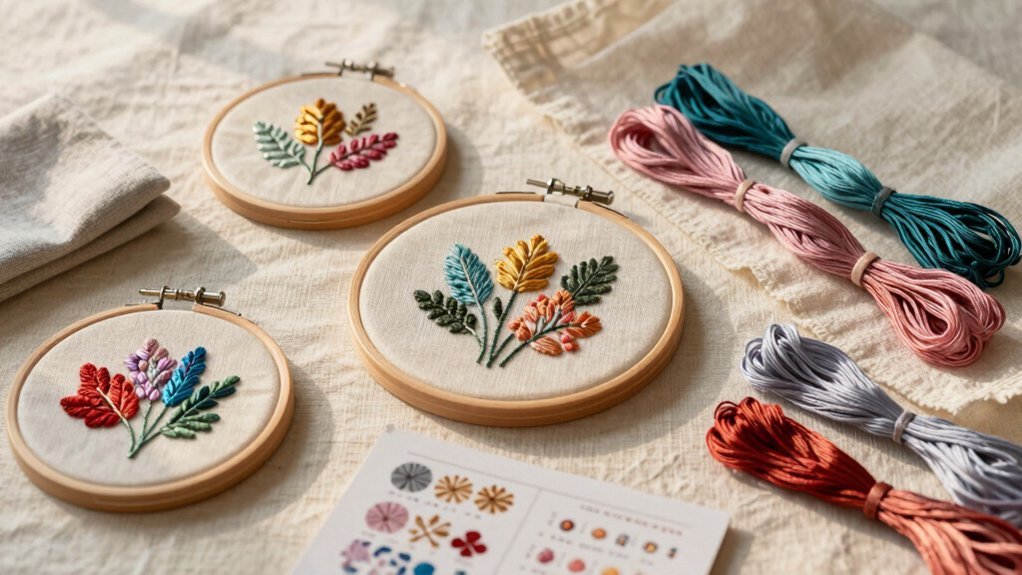

Leave a Reply